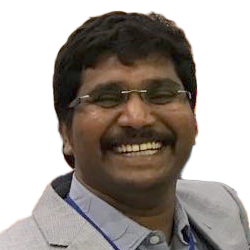
|
G. Prasad Babu
Founder & CEO
Geo Climate Risk Solutions Pvt. Ltd
BiographyPrasad Babu, Founder and CEO of Geo Climate Risk Solutions Pvt. Ltd. He focus on innovations and spatial platforms in climate change & disaster risk reduction, integrated water resource management and other social development sectors.
Prasad Babu has 15 years of experience of using spatial technologies and allied fields at various roles of his careers including Academic, Industrial and International Development Organizations.
Prasad Babu holds Post Graduate Degree in Civil Engineering with specialization of Geoinformtics and Engineering Geo Sciences from IIT Kanpur and another Post Graduate Degree in Applied Geology from Andhra University.
Abstract Need of Location based services in Emergency and humanitarian Response Quick response to emergency or crisis requires three important elements; Information/Knowledge about, a) Precise location b) severity and extent and c) immediate needs. The responding organization and humanitarian agencies are always in action to reach out to the needy during such situations. However, decision making during emergencies is crucial for the humanitarian organizations to deploy resources at right time to the right location, at the earliest possible. ICT tools custom designed and developed particularly for obtaining the precise location information needed by the humanitarians helps in quick data collection and analysis to enable informed decision making.
Humanitarian agencies always need to carry out Post Disaster Needs Assessment in the aftermath of disasters immediately, to assess the situation and needs of victims to decide the different types of humanitarian interventions suitable to the needs in the affected areas. However, the spread of affected areas and accessibility always causes a challenge in collecting and reporting damage and needs assessments, which prolong the time to formulate immediate recommendations and follow up under emergency situation. The delays in collecting and conveying findings from the field have often been identified as a critical gap in the humanitarian circle.
Disasters result in multiple severe consequences which in marginalized communities disrupts livelihood, aggravates existing food insecurity and malnutrition. This usually leads to reduced income levels, heightened food insecurity, increased food and nonfood needs and resorting to negative coping mechanisms such as loans, sale of assets, reduced food intake and other such measures. Humanitarian agencies provide support to such communities through assessing communitys needs and making available such products and items for quick recovery as well as long term recovery.
In this presentation, an integrated framework which uses location based services and geospatial technologies to provide appropriate solution in emergency and humanitarian actions. And also discuss the case studies to demonstrate the usefulness of location based services and geospatial technologies in emergency and humanitarian area.
|
